Expedition diaryYou can follow the expedition day by day en route to the South Pole by checking out our diary, which we will update as we go. You will also be able to see what Amundsen wrote in his own diary exactly 100 years earlier.
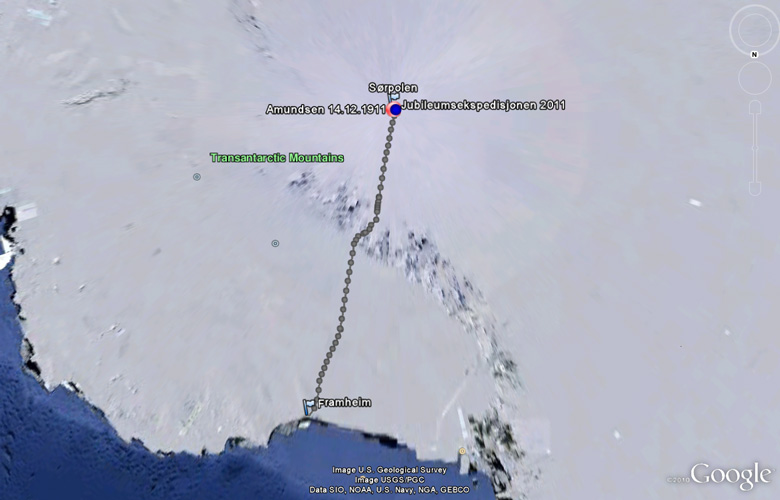 Diary entries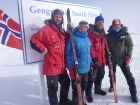 Expedition completedOur expedition is now at an end after yet another busy day at the South Pole with Norwegian and international media. Public interest in the last few days has been overwhelming. 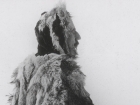 Most esteemed Mr. Amundsen,Thank you for allowing us to follow in the long-gone tracks of your skis for these past few weeks. To feel for ourselves your experiences and hardships in the icy wasteland. We had to clench our teeth to manage 4 km/h where you flew forward at 7.5 km/h behind the dogs. But we sometimes took pleasure in the wind. 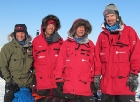 Vegard and Harald Dag have arrived at the South PoleAll four members of the expedition are now gathered at the South Pole, 100 years to the day after Roald Amundsen's great achievement. Vegard Ulvang and Harald Dag Jølle completed the expedition on skis and reached the Pole at 11.30 am Norwegian time.  The Jubilee Celebration at the South Pole has begunBecause of different time zones, we are ahead of the celebration in Norway. The first event was that Prime Minister Jens Stoltenberg skied the last few kilometres of Amundsen’s route in to the South Pole.  Quick changesAfter we had set up camp 80 km from the South Pole last night it became clear that time was too short and the kilometres too many for us to make it in time for the Jubilee festivities. 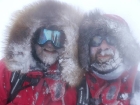 Jan-Gunnar and Stein P. flown to the South PoleTo make it in time for the centenary celebration, the two were flown in the last 80 km to the Pole tonight. 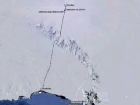 The home stretchWe're doing everything in our power to reach the South Pole by the fourteenth. We have two days and 80 kilometres to go. It ought to be doable. 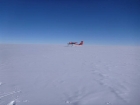 Faith and doubtFor the past few days our emotions have been on a roller-coaster along with our estimates of whether or not we will make it to the South Pole in time for the Jubilee 14 December. One moment we were in an optimistic mood; the next moment we were uncertain – to say the least.  Science and recordsToday we passed the latitude of Shackleton’s farthest south record from January 1909. It would have been an excellent reason to stop and reflect, but today we have only two things on our minds: 14 December and the incredibly gritty snow. 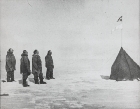 Amundsen's tentFish glue is what Amundsen called the abrasive snow we have been fighting against all day. It’s almost like skiing in sand, and over ten full hours of active skiing resulted in a disappointing 27 km. 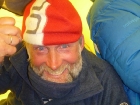 The fiverWe had almost given up. Amongst the team insinuations have been overheard to the effect that it was all a big bluff – a cheap publicity stunt by United Bakeries. The UB fiver was non-existent. 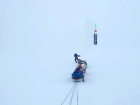 Titan DomeNew day, new opportunities. For the South Pole skier, only time will tell. Today provided a great example that Titan Dome, for all its 3200-m elevation, has more to offer than contrary winds and bitter cold. 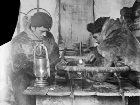 Contact“You’ll be home for Christmas won’t you Daddy?” The six-year-old’s voice sounded a bit troubled, and the sentimental father at 87 degrees south felt tears sting his eyes when he talked to his daughter by satellite telephone. 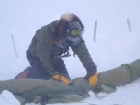 Charmer segmentThat’s the name Stein Tronstad from the Norwegian Polar Institute gave to the last map sheet, the one we are now using. At the moment, it’s difficult to see any charm. We have had yet another day of -30°C and strong headwinds. 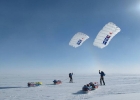 ContrastsThose who have never skied to the South Pole might imagine it to be frightfully boring. That the same old things are repeated day after day. But that is a far cry from reality.  The Pole of InaccessibilityIt has been a brisk day with gales and -30°C. The snow gets rough when it drifts and our skis meet much more resistance. We have also been obliged to keep a close watch on our faces and hands today because of the strong wind. 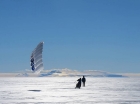 Sun on the tentSuddenly it was there again last night. The sun. After nearly three days’ absence it was glorious seeing sunlight shining on the cloth of our tents. It makes all the difference. 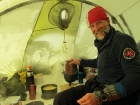 Breaking campWe most certainly agree with Amundsen that “the Butcher” is no inviting place. Two days in a tent. Cold, the air full of snow. We wanted to move on. 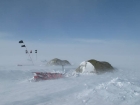 StormThis was supposed to be the day we started on the last 500 km to the South Pole. But the weather put a stop to that. During the night the wind picked up so much that it would have been foolhardy to set out on skis. The risk of frostbite was too great. 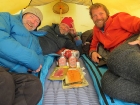 A day of restIt is a day of rest on the Plateau. This means the expedition’s official bloggers have the day off, and the task of reporting today’s news falls to the less serious team members. 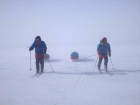 The Butcher“In four days we have reached the plateau from the coast,” wrote Amundsen proudly in his diary. He gave full credit to the dogs. “Come and say that dogs cannot be used here.” 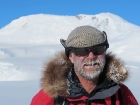 No Mount JohansenIt isn’t possible to write today’s text without expressing our gratitude to Alse T. Johansen’s expedition. They struggled manfully up the slopes, leaving wonderful tracks behind them! 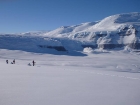 A world of iceAn incredible two thirds of the world’s fresh water – water in the atmosphere, rivers, lakes, glaciers, and groundwater – is stored here in Antarctica. Today we have waded in deep powder snow, gaining 800 metres of elevation, through a spectacular frozen landscape. Glaciers tumble down between the mountains, making their way to the Ross Sea. 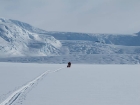 Finding the wayWe are impressed. How did the five men who were here in 1911 gain an understanding of the landscape so quickly? How did they know which path to choose? Where we are supposed to make our ascent, it looks as though the onward road ends abruptly in a vertical wall of rock. 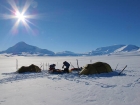 Axel HeibergWords escape us. Even a seasoned adventurer falls silent when he looks around here. Modern-day superlatives like wicked cool, awesome, and insane spring to mind as our skis swish ever closer to the Axel Heiberg Glacier.  Mount BettyThey hadn’t had bare earth under their feet since leaving Madeira in 1910, but now Amundsen and Bjaaland were standing on a little hump of rock at over 85 degrees south. Amundsen named this hill Mount Betty after the nanny who had looked after him throughout his childhood. 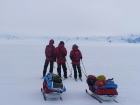 HalfwayAt lunchtime today we passed kilometre number 655. A bit more than the distance across Greenland. And we are still on the Ross Ice Shelf – this gargantuan floating glacier.  Choose to fight!Vegard’s children have inscribed a greeting on his bowl. It says “Choose to fight, Daddy!” Today we have all fought. 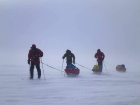 Only for hard-core enthusiastsAfter 19 straight days without a break we were sorely tempted. If only we hadn’t been so far behind Roald A. 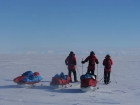 What an adventure!This is an adventure. It’s an incredible adventure. We’re tired and we’re cold, and we won’t pretend we rejoice every time our skipoles hit the snow. But the big picture is that we are both humbled and grateful to be experiencing these days. 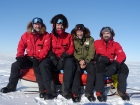 There was a lot more going on in 1911“Forget it! There’s no way we can stay on course with this wind.” Our ski-sailing expert from Kirkenes lowers his kite to the ground. “Damn!” think some of us, “another day of slogging.” 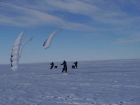 Sailing towards land!Yesterday we sighted land. That was South Victoria Land, in the southwest. Today we spotted more land. Tall mountains towering over the Ross Ice Shelf. 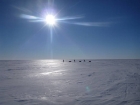 A new eraA new era has begun for the centenary expedition. We have sighted land! Little white peaks were suddenly visible above the horizon in the southwest. 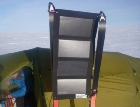 CommunicationHere we are in the middle of nowhere, communicating with the world every evening by e-mail and an Iridium satellite phone. Our blog posts take shape as we ski and we often use our breaks to try out ideas and get comments. 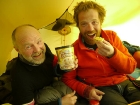 Warm feet!Yesterday’s wind let up enough for us to continue and after a short stint of skiing we arrived at the depot. 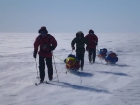 HeadwindFor the first time, the weather has stopped us. Halfway through what should have been our next-to-last stretch we were obliged to throw in the towel and admit that the wind had defeated us. 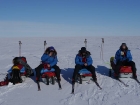 Amundsen's depotsOn 11 April 1911 the last dogsled came to a halt at Framheim. For two months, Amundsen’s men had been moving provisions – seal meat, dog pemmican, biscuits, butter, chocolate, petroleum and a selection of gear – 3000 kilos in all.  A thousand kilometres to goDarling body, please be nice, – And carry me across the ice. 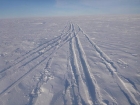 Ice shelfWe are skiing on an endless expanse of ice. There are no landmarks to be seen. The Ross Ice Shelf floats on the ocean and is several hundred metres thick. It rises and falls with the tide, but that movement is undetectable to us. 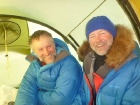 A glorious day!The temperature was 22°C when we woke up and noticeably more pleasant than the past few days. And then the wind veered to one side and we hoisted our sails. 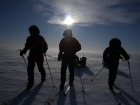 Being towed to the South PoleThe flat expanse of the Ross Ice Shelf made it possible for Amundsen and his team to be towed on their skis behind the dogsleds. We trudge onward and search longingly for anything that might lend a helping hand. 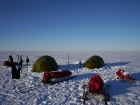 Swapping partnersAfter one week sharing a tent with the same person, it’s time to switch partners. Until now, Stein and Harald Dag have shared one tent and Jan-Gunnar and Vegard have shared the other one. 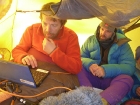 Young in the High NorthIt has been another day of glorious sunshine. It was almost pleasant in the morning, but when the thermometer shows -25°C it doesn’t take much of a draught to make you feel wretched. And we had a bit of that towards the end of the day. 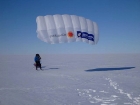 New milestonesWe encourage ourselves out here on the ice by taking note of every new milestone. Today we had several reasons for celebration.  Rolf’s excursionHow do you select the team for a centenary expedition to the South Pole? This project began with a phone call from Rolf Bae to Stein in the winter of 2008. 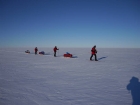 Discipline and very little fish glueToday we changed our strategy and are now skiing for 50 minutes at a stretch instead of 60 minutes. Covering this many kilometres requires discipline and we are trying to shorten our rest breaks. Ulvang is the slave driver. 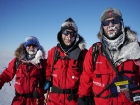 Just like skiing on the Hardanger Plateau“A superficial reading might lead one to believe that an expedition to the South Pole is no more challenging than a ski jaunt through Nordmarken or perhaps over the Hardanger Plateau.” 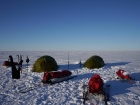 13 days after AmundsenWe have no competitors. And we keep telling ourselves we must run our own race and start gradually.  The first kilometresWe set out at 9 am with the sun at our backs and the wind in our faces. At last we are moving towards our goal! 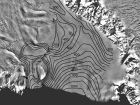 A wall of iceWhen approaching Antarctica by sea one is met by an inhospitable wall of ice several tens of metres high – the barrier. 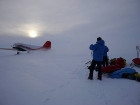 Bay of WhalesAt long last we have arrived at the Bay of Whales. We flew for six hours with one stop to refuel, covering a distance roughly the length of Norway. 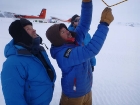 Polar nomadWe can’t leave Union Glacier without saying more about Ronny. He was the first person we met when we disembarked from the aircraft. 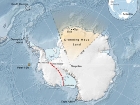 Green light for departure to the Bay of WhalesWe have now been given the go-ahead to depart for the Bay of Whales at 2 am Norwegian time. Travel time 7-8 hours. 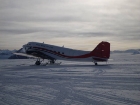 Union Glacier“The first night out is never particularly comfortable, but this one was awful.” That was Amundsen’s acerbic comment after the first night in a tent, and we echo the sentiment 100 years later. A sudden shift from a hotel bed to -35°C does not pass unnoticed. 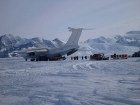 We've arrived at Union GlacierWe landed at Union Glacier 15.45 Chilean time, which is 20.45 Norwegian time. Now we are waiting at the ALE base. They may fly us onwards tonight, but probably not until early tomorrow (Chilean time). 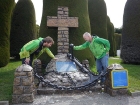 The Norwegian who raised the Chilean flag in AntarcticaThe last thing we did before leaving Punta Arenas was to visit the cemetery and honour the memory of Adolf Amandus Andresen. “Capitan Adolpho Andresen” from Sandefjord is the unknown Norwegian who initiated commercial whaling in the Southern Ocean. He harpooned his first whale in the Strait of Magellan in 1903. 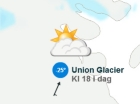 Finally on our way to AntarcticaToday at last the weather is on our side and the expedition team is being flown to Union Glacier on the Antarctic continent.  All thanks to NansenThe Englishman Mike Sharp has been transporting people to Antarctica since the mid-1970s. But in his opinion, Nansen is a greater hero than Amundsen. 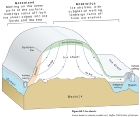 Where ice melts without warmthWe sit hunched around yr.no intensely scrutinising the weather conditions in the Bay of Whales, on the Axel Heiberg glacier and at the South Pole. “How can scientists worry about ice melting in Antarctica?” asks Vegard. “The temperature is -30°C and that’s what we get when it’s springtime in Antarctica!” 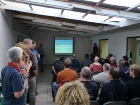 We will do as plannedALE, the logistics company that will transport us to Antarctica, are working as hard as they can to get us all south. The most recent weather forecasts show a possibility of flying on Friday. 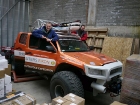 South Pole speed recordMany people want to go to the end of the Earth. Yesterday we saw the custom-made Toyota that will set a speed record in January. Traversing the distance between Union Glacier and the South Pole (around 1000 kilometres) in 24 hours is a possibility. 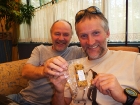 Who’ll find the fiver?There’s no denying that it’s frustrating to sit here day after day. We can see how Amundsen’s red circles light up on his southward course on our home page.  Bar ShackletonToday it is one week since our aircraft was supposed to take off towards the south. We still don’t know how long we will be stuck in Punta Arenas. Yesterday we killed some time with a cup of coffee at Bar Shackleton. 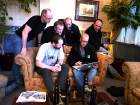 The race is being recreated by the British themselvesAs the days pass and the delay grows longer, more and more expeditions are accumulating in Punta Arenas. Yesterday we had a visit from “The Scott-Amundsen Centenary Race 2011-12”, a British expedition that is recreating Scott and Amundsen's race to the South Pole.  Another delay!We were totally convinced that today would be the day, but once again we had discouraging news. Everything remains uncertain, but now they are talking about Monday as the next possible opportunity. 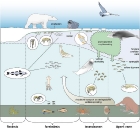 The Poles – canaries in the mineYesterday we called on the Chilean Antarctic Institute. Our visit was both pleasant and useful: we were shown around and given a thorough introduction to their research. They are interested in many of the same issues as we are. 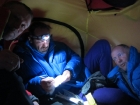 All to no availWe are receiving a few questions about how we pass our time while we are waiting. What on earth do you talk about when you are expected to arrive at the South Pole on 14 December and must ski 1,300 km to get there, and have to ski faster and faster for each day’s delay? 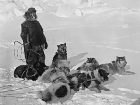 The day we should have set offToday we were supposed to have put on our skis, but we are still 4,500 kilometres from Bay of Whales.  Smooth skiing in cold conditionsOur skis have been subjected to intensive treatment in preparation for when we put them on in Hvalbukta, and they have been waxed as if Petter Northug were about start an olympic 50 km race in cold conditions. 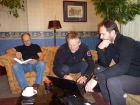 Discouraging newsEarly this morning they had finally cleared the runway at Union Glacier. They’ve been working hard both day and night down there. But they didn’t finish in time to beat the approaching low pressure zone.  Fighting weightIt looks as though we will start on our way tomorrow, Tuesday – and while we wait for the final go-ahead, we might as well have another meal. 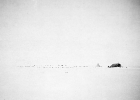 Delayed!Our departure has been postponed. It is taking a long time to remove the hard-packed snow from the runway on Union Glacier. Take-off will not be until tomorrow at the earliest, almost exactly 100 years after Roald Amundsen set off from Hvalbukta. 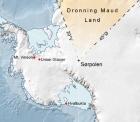 What would Amundsen say?It’s hard to tell whether Roald Amundsen would have been horrified or delighted, proud or embarrassed if he could see what’s happening along the route his sleds followed in the autumn of 1911. Is he turning in his watery grave or chuckling behind his beard? Maybe he is wondering what point there can possibly be in repeating a feat he had already accomplished a hundred years ago.  Big birdIlyushin il-76 was the Soviet Union’s version of Lockheed’s C-130 Hercules, but was considerably larger. The Soviet Air Force started using the plane in June 1974 and il-76 became the main strategic air-freighter east of the Iron Curtain. 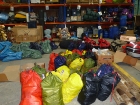 Details, detailsOur last weeks before leaving Norway were hectic. Book release, celebration of Nansen’s birthday, preparation at work and at home. 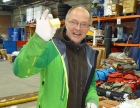 Punta ArenasThe expedition team has arrived in Punta Arenas in Chile and final preparations are being made. Soon the first flight of the season will take off bound for the landing strip on Union Glacier in Antarctica.  At last!Everyone is pretty tired after a number of hectic days – or weeks. Isn’t it strange, how much always remains to be done at the last minute? In addition, we all had roles to play in yesterday’s celebration of Nansen’s 150th birthday. |
South Pole 1911–2011 is an informational outreach project run by the Norwegian Polar Institute
Contact person:


